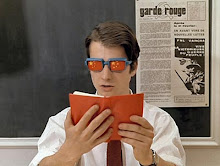
Kraftwerk’s debut record finds the core duo of Ralf and Florian deep in the heart of Krautrock experimentation. Four extended cuts feature the brittle coldness and abrupt sonic detours which were part of that still fascinating ‘70s German art-rock movement’s aural palate. For those that love that Motorik beat as exemplified by Neu! and Kraftwerk’s later AUTOBAHN (and also absorbed rather smartly into the Stereolab sound), well you can find some of that here. The total sum of the record’s duration is a far more abstract proposition, however. I’d be okay with Radiohead playing some future Super Bowl Halftime show if only for the miniscule chance that they’d decide to pull a cultural fast one and cover this record’s “Ruckzuck”: it’s got a great beat and you can dance to it.

THE LIFE OF THE WORLD TO COME continues The Mountain Goats’ progression into the large, warm, unashamedly polished territory that is coming to define the 2nd or maybe 3rd “era” of John Darnielle’s work. As raw and startling as the early boombox stuff was (is), it’s really starting to feel that his more recent, more “pro” (sorry) albums are going to define this dude’s legacy for subsequent generations. But hell, he’s still got a long way to go. And the mutually beneficial relationship between the sound of Darnielle’s voice and the sturdy beauty of his lyrics continues: when he utters the line “I will do what you ask me to do/because of how I feel about you” in “Genesis 30:3” it gets me every time. As great a record about faith and humanity as I can think of right now.

Lowell Davidson’s sole recording, a 1965 trio date for ESP Disk featuring Gary Peacock on bass and the mighty Milford Graves on drums, is a major work in advanced piano studies. Davidson’s style is comparable to early ‘60s Cecil Taylor in its spikey determination to forge new paths, but his playing also rubs up against the great harmonists Monk and Herbie Nichols. There is higher density and moments of increased momentum on display in Davidson’s sound that when coupled with Peacock and Graves’s righteous refusal to even momentarily entertain the idea of falling into a trad piano trio accompanist role basically insures Davidson will never leave the margins of outsider jazz lore. Only recording one album doesn’t help matters either. Oh well. It’s there if you want it.

Can’t say that I’ve ever really been seduced by the sound of Sinatra. Sure, the stuff with Riddle is a major achievement, particularly when heard on a sweet hi-fi setup, but so much of the guy’s output inspires little else in me than the desire to chain smoke cigarettes and regress into outmoded social mores. Sorry. I kept hearing people speak highly of WATERTOWN however, often making comparisons to Scott Walker. And I’ve only listened to this a few times, but I feel it’s a good one. It may grow into a great one. It definitely has an open desire to engage a rock-era audience, though it never trips up and falls prey to ham-fisted attempts at being hep. There is a lushness and grandiosity that’ll certainly make fans of Walker and Serge Gainsbourg stand up stiff and salute. Did I mention it’s a concept album? No? Well, it is. An ambitious and, dare I say it, classy piece of work.

James Carr has been described at least once as the Syd Barrett of soul. “The Dark End of the Street” is his most famous tune, and while he was never considered a hit maker (seven of his singles made the R&B top 40, though), he’s justifiably legendary for the depth and range of his emotive abilities and for the focused uniqueness that defines his work for the Goldwax label. Carr excels in my ears at mid tempos, where he recalls the sturdiness of Otis Redding while never sounding even remotely like a rote copyist. The bands backing up Carr on THE COMPLETE GOLDWAX SINGLES are simply shit hot, landing in classic southern soul territory defined by Stax and Muscle Shoals, but with more modest recording circumstances lending the music a tougher, more garage-like feel. And frankly, there’s not a bad song in the bunch. Even a dangerous endeavor like covering the Bee Gee’s twee-pop nugget “To Love Somebody” succeeds. Every bit of James Carr’s retroactive status as a deep soul superstar is deserved.

No comments:
Post a Comment